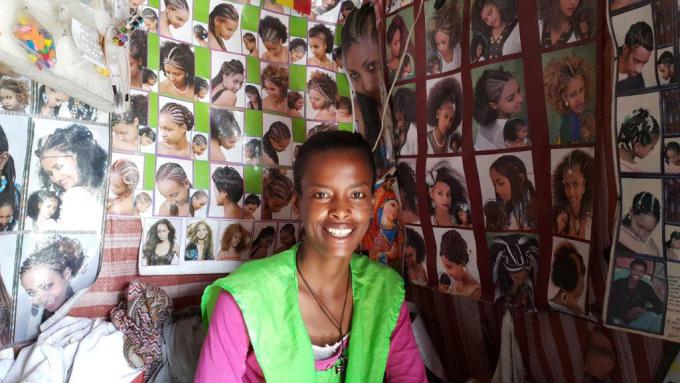A step forward to a sustainable livelihood: Ayitu’s story

By Zakir Elmi
“When I was selected as one of those vulnerable youth to participate in the youth livelihood initiative, I knew my life was going to change for the better” says Ayitu Bekele, a young resident in Woreda 7 of Akaki-Kaliti sub-city in Addis Ababa.
Ayitu, 25, is the eldest sibling in her family and the only one living with and taking care of her long ill mother and retired father. Her father’s pension is too small to even buy the family’s daily bread, let alone to support Ayitu to continue her school. So Ayitu had to drop out at grade seven.
In order to support herself and her parents, Ayitu had to look for a means of livelihood at young age. She started out as a waitress in a restaurant, and she managed to go to a vocational college to study hairdressing while still waiting on tables. After eight months of training, she specialized in the Ethiopian traditional female hair styling called Shuruba (braid). However, she was short of resources to start a business with the skills she picked up from her training. Three years ago, Save the Children’s Partnership for Success/Youth Livelihood Programming selected Ayitu to be a project beneficiary because, as per the criteria set by project stakeholders, she was among the marginalized young women and men in Akaki-kaliti sub-city of Addis Ababa.
At the beginning, she has received a five-day training on street business toolkits. Using the inputs that she got from that training and taking her vocational training into consideration, she has developed a business plan to open a hairdressing business by renting a small shop. In her financial proposal, she put an estimate of 3,000 birr required for the startup.
Her proposal was accepted, and she was also linked to Addis Ababa Credit and Saving Institution (ACSI) to eventually receive a 1000-birr loan from them.
“That was not enough to start my business, but I supplemented that with my own small savings and opened my shop. Through time, not only was I able to cover my running cost, but I could also settle my loan with ACSI. As a result, I was qualified to again take a 2000-birr loan to grow my business. In the meantime, EDA also linked me to a female mentor with rich experience in my type of business,” said Ayitu.
Three years on, her business is growing and she makes a net weekly income of 200 to 300-birr. She feels so great that she could afford to have her mother treated in standard health facilities. Her mother feels much better now, and this gives Ayitu a great pleasure. She also paid 13,000 birr so far for the 10/90% government housing scheme [10% of the housing cost is subsidized by the government]. She is waiting for her turn to be a condo owner while paying the down payment on a monthly basis. She pays 750 birr a month, and the total cost for the condominium will be 80,000 birr.
“I was told this Save the Children project came through Emmanuel Development Association (EDA) funded by Global Affairs Canada (GAC). I am thankful to them all. I have become a successful entrepreneur other young men and women can learn from on how to grow a business and transform life with minimal material, technical and financial support,” Ayitu concluded.
 Ethiopia
Ethiopia